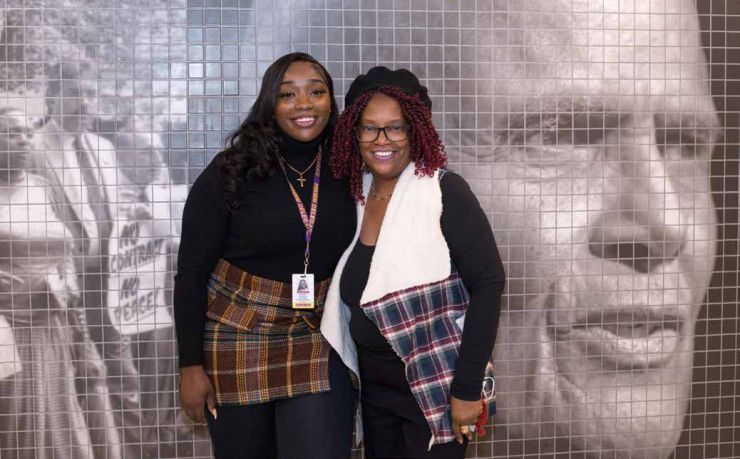Paying it Forward
March 6, 2023
Nobody wins unless everybody pays their fair share.

Despite Kingston being less than half Bannster’s age, when the two meet for the first time to talk about the value and importance of Union dues they realize they have a lot more in common than they thought. Dealing with pushback they sometimes get when signing up new members, is an almost universal experience for Union Delegates.
For younger members who do not yet understand the value of Union healthcare and pension benefits, and complain that their dues are an extra expense, Bannister tells them, “You’re wearing $250 sneakers and carrying a fancy pocketbook with no money to put in it.”
“If you don’t do your part to fund the Union,” she adds, “pretty soon you’re going to find that you stop getting those annual pay increases.”
Without the money from dues, there would be no Union lawyers at the bargaining table. There would be no research team to feed strong arguments to the Bargaining Committee about how their institution could access more local, state and federal funding.
Kingston may be less experienced than Bannister, but she is already very well aware of the connection between who gets into public office and how much money is allocated towards healthcare.
During last November’s midterm elections, she took part in one of the “Brigades” that helped ensure Kathy Hochul finished out her term as New York State Governor.
As well as working full-time and engaging in political action, Kingston is also studying to be an RN, with the help of her 1199 education benefits.
A few years before she retired, Bannister’s hospital was taken over and became known at Montefiore Medical Center Wakefield Campus.
It is currently the only hospital in the Montefiore network with 1199 RNs. Kingston was glad to hear it.
“I definitely want to go to work in an 1199 hospital when I become an RN,” she says.
Both agree that it is not just younger members who need convincing about dues. “Sometimes the elders have a mindset that the union doesn’t do anything for them,” says Kingston. “So, I tell them my story—that I came here at six-years-old from Guyana and graduated high school when I was 19, and then I found a union job.
The union gave me the opportunity to be somebody.”
Bannister is more pragmatic. “Management is always going to try to make us pay for our healthcare, by trying to introduce co-pays and what have you. Rising healthcare costs are going to hit the elders first,” she says.
“Management is sliding in nondues paying members into the hospitals more and more,” she adds, “If you don’t catch them at member orientation, it is hard to find out who is paying and who is not.”
During the pandemic, many institutions stopped the practice of new member orientation. In too many institutions it never came back.
That is one of the reasons why charting your department is so important, Bannister tells Kingston. “You have to know exactly who is in your department and their level of seniority.”
1199ers are able to negotiate some of the highest pay and best benefit packages in the country because the Union brings large groups of workers together to fight collectively. Maintaining that collective energy requires constant vigilance, though. Nobody wins unless everybody pays their fair share.

